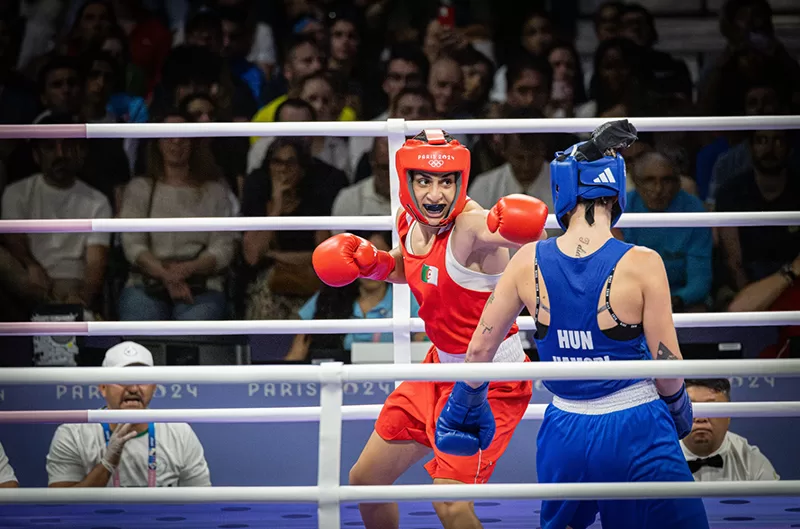Boxer Imane Khelif broke down in tears last week following her victory over Hungary’s Luca Anna Hamori in the welterweight quarter final at the 2024 Paris Olympics guaranteed her a medal. It was an emotional moment for the Algerian not just in terms of her sporting achievement but because she had spent the past week embroiled in a misinformation storm.
Khelif – who is now guaranteed at least a silver medal after her victory over Thailand’s Janjaem Suwannapheng – was labelled as transgender in several viral social media posts, an inaccuracy which was then parroted by some news organisations and politicians. Khelif is neither transgender nor identifies as intersex.
Much of the recent viral outrage at Khelif’s Olympic success stemmed from a claim by the Russian-led International Boxing Association in 2023 that she and fellow boxer Lin Yu-ting of Taiwan had failed certain gender tests. These tests have never been published and are, as of today, unverified. The International Olympic Committee (IOC) revoked the IBA ruling, stating the decision was “arbitrary”, “sudden” and “taken without any proper procedure”.
The disqualification resulting from the IBA tests also apparently came after Khelif beat a Russian prospect at an IBA event.
There have been mixed reports over the content of the apparently secret gender testing, with IBA president Umar Kremlev claiming in a chaotic press conference that the pair had high levels of testosterone while the organisation’s chief executive alleged these were actually chromosome tests. Even beyond the lack of cohesion and clarity, the issue with sex testing itself is that every version invites criticism when scrutinised because most sports are organised according to a strict male-female binary, while nature does not follow such a binary – sex is more complex than that.
The IBA does not oversee Olympic boxing. Their credibility was seriously damaged in recent years following longstanding accusations of a lack of transparency and poor governance. They were finally suspended as boxing’s governing body and stripped of involvement in the Olympic games. Neither the IOC nor World Boxing endorse the ruling made by the IBA.
The IBA has close links to Vladimir Putin and Russia, a country which has been involved in massive misinformation campaigns around the Olympic games because their athletes were not allowed to compete under the Russian flag.
According to AP, Russian bots have been responsible for amplifying the Khelif controversy. The story was soon picked up by voices with huge followings, including billionaire X owner Elon Musk. It travelled beyond social media, with several news organisations and politicians wrongfully asserting that Khelif is transgender. US-based newspaper The Boston Globe were forced to issue an apology for labelling Khelif as transgender in one of their headlines. Fox News also labelled her as a transgender boxer live on air, while host Ainsley Earhardt wrongly described her as someone who identifies as a trans woman. Republican presidential candidate Donald Trump repeated these false claims.
The dangers of misinformation have been well-documented in the age of social media but are as relevant as ever in sewing division. Fake news spreading on social media sites is currently fuelling a number of political agendas and was cited as one of the catalysts for the far-right Islamophobic and anti-immigration riots in the UK.
BBC disinformation correspondent Marianna Spring, who deals with such viral mistruths on a daily basis, told Index in February that the unregulated spread of misinformation can cause real-world harm, so it’s crucial in a free society to call it out.
“If you are being repeatedly hounded or abused online, your freedom of expression is compromised,” she explained. “What I’m doing is exposing the harm these extremist truths can cause rather than policing what people can say.”
Khelif herself has been subjected to hate and abuse on a huge scale, as has Yu-ting, who is also competing at the games and is guaranteed a medal. IOC president Thomas Bach condemned the narrative surrounding the two athletes, calling it “politically motivated”.
“All this hate speech, with this aggression and abuse, and fuelled by this agenda, is totally unacceptable,” he said during a news briefing.
Even more worryingly, these allegations could have had serious consequences when you consider that in Algeria – Khelif’s home country – being transgender is illegal.
There are legitimate questions in a free society to be raised around gender in sport and the IOC’s Framework on Fairness, Inclusion and Non-discrimination on the basis of gender identity and sex variations was criticised by some international sports medicine bodies in 2022. No one should be silenced for asking these questions or having the conversation.
But the heat around Khelif has not been about asking questions. Instead the issue here is one of jumping to conclusions. What could have been a heartwarming story of a woman finding sporting success against all odds became a cautionary tale of the dangers of misinformation and the speed at which unchecked information or false claims can be spread on social media platforms, endangering people’s lives and distorting reality. Who wins the gold medal here? Russia.






